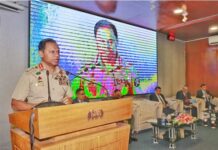Educationists blame shortage of facilities

Students of Viqarunnisa Noon School and College show V-sign after their SSC results were published on Wednesday.
Less than 50 per cent students from rural schools passed the Secondary School Certificate and equivalent examinations for the third consecutive year ending 2016.
This year, the nation wide pass rate is 88.29 per cent, showing a nominal improvement from 87.04 per cent in 2015 but a deterioration from 91.34 per cent in 2014.
According to the SSC results announced Wednesday, the poor performers were from 875 schools mostly located in the rural areas.
In 2015 also, less than 50 per cent students who appeared in SSC and equivalent exams from 947 rural schools passed compared to 87.04 per cent nation wide.
In 2014, the picture was the same with less than 50 per students from 553 rural schools and madrassahs passing the exams compared to 91.34 per cent nation wide.
The nation wide pass rate was higher due to better performance of students from the urban areas.
The poor performers were from the rural schools, said officials of education boards.
They said that the number of schools and madrassahs with all their students failing in the exams increased over the last three years.
All these schools and madrassahs are located in the rural areas, they said.
In 2014, no students sent by 24 rural schools and madrassahs passed in the SSC and equivalent exams, they said.
In 2015, no student sent by 47 rural schools and madrassahs could pass the exams and this year the number of schools and madrassahs sending such students increased to 53.
Rural schools poor performance was attributed by education board officials to shortage of qualified teachers, lack of libraries, laboratories and others facilities.
They said that the parents of rural students can’t afford private tuition or coaching to help their children overcome the deficiencies in classroom teaching.
The results announced Wednesday revealed that 94 per cent of the students from the schools in the capital passed the exams compared to 81 per cent of the students from Munshiganj.
This year, 95 per cent students from the port city of Chittagong passed the exams compared to 78 per cent from Rangamati.
Professor emeritus Serajul Islam Choudhury blamed the perennial lack of skilled teachers, libraries, laboratories and academic environment in rural schools for their recurrent poor performance.
He said rural schools were deteriorating also due to the fact that well off people send their children to schools in urban.
After analysis of the reasons action would be taken against the schools from which none could pass the exams said education minister Nurul Islam Nahid.
As rural students fail in English and mathematics, he said, arrangements had been put in place for taking extra classes on both the subjects in 8,000 rural schools.
Shortage of trained and skilled teachers in rural schools is the principal cause of their poor performance said Barisal board chairman Ziaul Huq.
The same view was expressed by Sylhet board chairman AKM Golam Kibria, Madrasha board chairman AKM Saif Ullah, Dhaka board’s controller of examinations Srikant Kumar Chanda.
Another cause identified by Ziaul Huq was that due to lack of rural parents’ education they cannot provide the needed guidance to their children.
Saif Ullah said the madrassahs in the rural areas generally have none to teach English and mathematics.
Source: New Age









